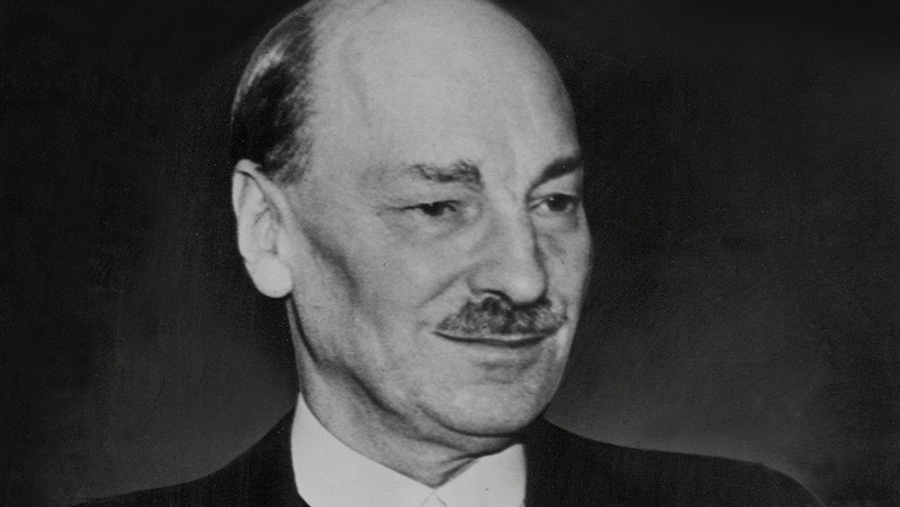Opinion: Farming needs the spirit of Attlee
 Clement Attlee © Associated Newspapers/REX-Shutterstock
Clement Attlee © Associated Newspapers/REX-Shutterstock Chancellor Philip Hammond’s assurance that following Brexit the Treasury will continue to support agriculture at current levels until 2020 was bound to attract a hostile response from other interest groups. Sure enough, it did.
The NHS, of course, wants all the cash that’s not spent on the CAP in future.
The National Trust, via its chief executive, Helen Ghosh (formerly head of Defra) suggested CAP policies – which Hammond’s promise endorsed, albeit for a short period – are damaging and should be ditched.
The RSPB claimed the “disastrous” decline in farmland birds could be attributed to support systems and that more public money should be allocated to birds rather than agriculture.
Both of these latter organisations, by the way, are large landowners and have been among the biggest recipients of EU and government support payments.

David Richardson farms about 400ha of arable land near Norwich in Norfolk in partnership with his wife Lorna and his son Rob.
Pressure groups
So it goes on, with each single issue pressure group promoting its priority against farming.
There’s no mention of food or feeding our expanding population.
And UK food security, which has been declining fast recently, is either ignored or dismissed as being unimportant, despite the fact that 40% of Britain’s food is now imported and the food trade gap has virtually doubled this century.
We should, of course, thank the new chancellor for providing the smidgen of security his announcement represented.
See also: Imported goods give the industry a healthy challenge
But we can’t be blamed for wondering what will happen after 2020?
Antipathy towards UK farming is not new and has historic precedents.
Industrial Revolution
Ever since the Industrial Revolution superseded agriculture as the main wealth creator in the country, farming’s relative importance has been downgraded.
Factory workers, it is perceived, need the cheapest possible food in order to limit their wage demands and increase industrial profits.
Back in 1904, for instance, when British farmers were suffering from cheap imports from America and the Empire, the then-minister of agriculture, the Earl of Onslow, asked the prime minister, Arthur Balfour, to assist the farming industry in its hour of need.
Balfour, it is said, refused, saying Great Britain was an industrial country and her role in the world economy was not to produce her own food, but to produce the goods with which to purchase food from other countries which were truly agricultural.
Second World War
Apart from two periods during the past century when such concepts were temporarily shelved because of war and the literal possibility of starvation – because German U-boats sank food ships crossing the Atlantic – such prejudice in government circles has continued to exist against agriculture.
However, Britain was so close to disaster during the Second World War that, in 1947, prime minister Clement Attlee’s minister of agriculture, Tom Williams, initiated measures through the Agriculture Act of that year to pursue a measure of food security for the benefit of consumers.
He introduced guaranteed prices for farm commodities and for convenience paid them through subsidies to farmers to ensure continuity and expansion of supply.
But within 10 years those subsidies had been labelled “feather bedding” for farmers and the prejudice against our industry returned.
A hundred years or so after Onslow and Balfour, I asked the then-new secretary of state for Defra, Margaret Beckett, if her department had or were intending to assess domestic food security.
She replied that the world was awash with food which we could import and the impression she left me was that she didn’t intend to tie up her own or her civil servants time on such matters.
So, what will happen after 2020? Will whichever government is in power then follow the example of Balfour or Attlee? If the former, God help Britain.
